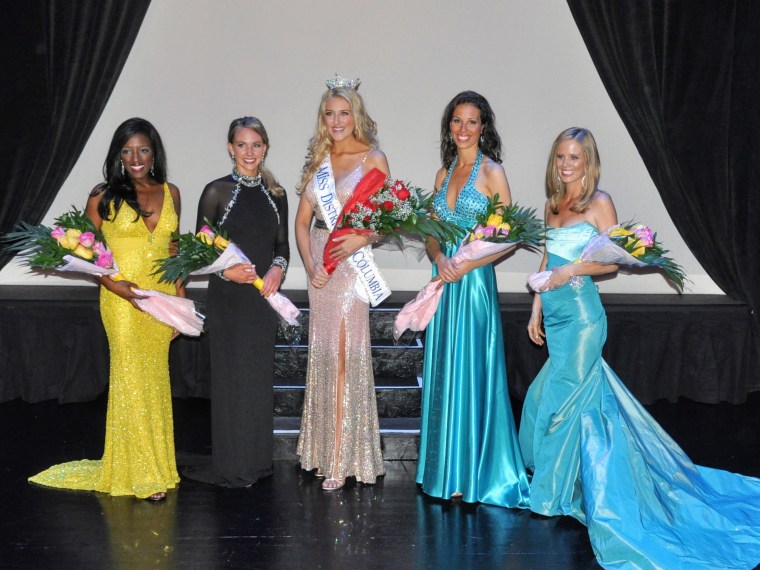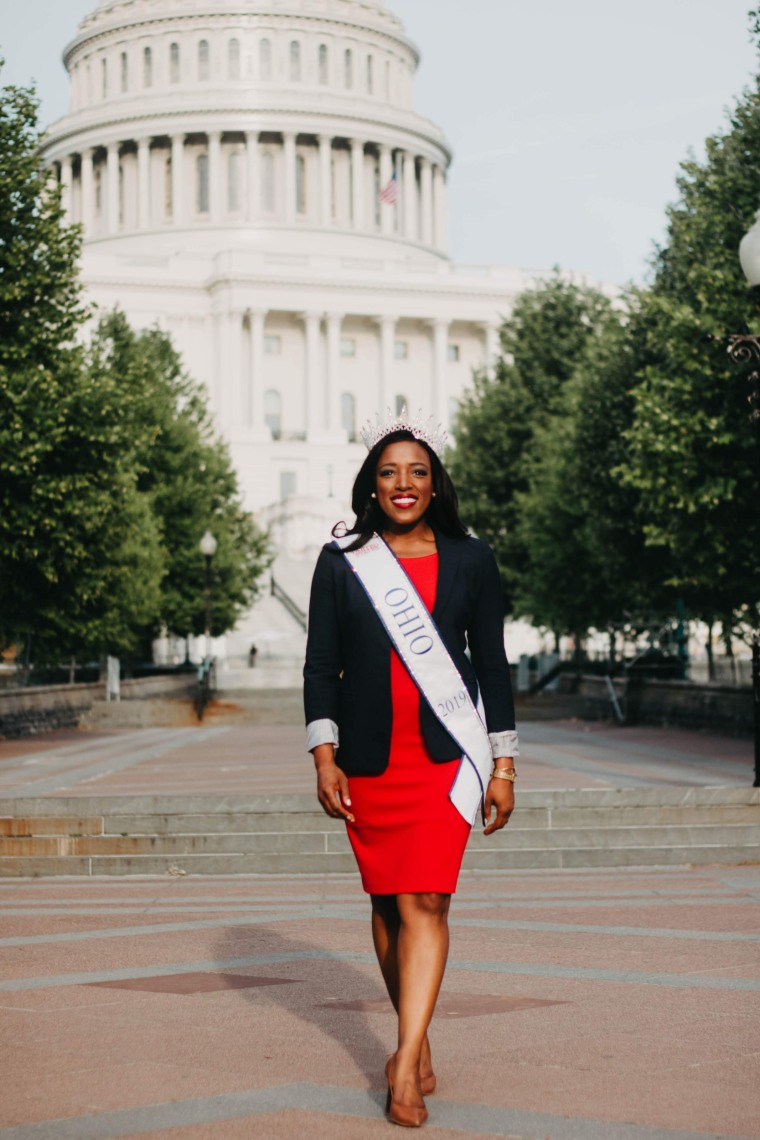I entered my first pageant in 2003, the Miss Violet Festival, during the summer before my senior year of high school. I was one of those die-hard school spirit types — on the sidelines at football games with pom-poms, fully devoted to my community. I didn’t win that one, but entering the pageant wasn’t about vanity — it was about representing where I came from.
Then, in November, my world shattered. At 17, I was at a party in a nearby town when I was raped in a dark basement by someone I didn’t know. In an instant, safety became a luxury I’d taken for granted, and the world I’d known was fractured beyond recognition. The months and years that followed were brutal. Cases like the Duke University lacrosse scandal and the relentless tabloid takedowns of women in the early 2000s hammered home one message: Girls like me were to blame. I told myself that if I’d been more “put together,” if I’d carried myself differently, maybe things would have been different. I would have been safe.
By the time I reached Miami University the following year, I was desperate to take back control. I decided to start an organization for young women focused on self-esteem — something I thought might offer others, and maybe myself, a way to feel secure. I went to a librarian, a recommended faculty sponsor, and shared my idea. Unbeknownst to me, she was a longtime Miss America volunteer. She listened carefully, then surprised me. “What if,” she said, “you set your sights on Miss America?” I hadn’t seen that coming — but it set me on a path that would lead me not only back to the pageant stage but to a reckoning with what it meant to be seen as “beautiful” — and to feel safe — in a world where Black women are so rarely allowed either.

I’ll never forget my first time competing at the state level in the Miss America system. Walking onto that stage, I felt a strange combination of nerves and determination, my stomach a tight knot beneath layers of rhinestone fabric. I was surrounded by women who moved with ease, their polished confidence a stark contrast to the whirlwind of emotions I knew to keep in check. I could feel the weight of expectations — those I carried for myself and those the world placed on me as a Black woman daring to stand center stage in a competition that hadn’t been built with people like me in mind. As I took my place, each practiced smile, every careful movement felt like a silent negotiation between who I was and who I needed to be. I realized, even in that moment, that my presence on the stage was a statement, a quiet rebellion against an unspoken rule that women like me belonged only on the periphery.
I realized that my presence on the stage was a statement, a quiet rebellion against an unspoken rule that women like me belonged only on the periphery.
America has a problem with Black bodies. In every corner of society — from policing to pageantry — Black lives are continually devalued, dismissed or deemed dangerous. The same prejudice that forces Black women to fight to be seen as beautiful also denies us the right to safety — both physical and emotional. We can be exceptional, even crowned, but only if we meet a mold that centers a very specific kind of mainstream comfort and approval.
Being in beauty pageants only made all that clearer to me.
A coach suggested I straighten my hair to look “more polished.” A former titleholder assured me, “Yes, I believe they crown Black women” — implying that while it had happened before, it was extremely rare and far from guaranteed. And then there was the comment I’d heard countless times, from pageant volunteers, from boys in junior high, and even from dates after college: “You’re so pretty … for a Black girl.” Why the qualifier? Why was my beauty always framed as an exception? When I looked around, I heard the Black women who succeeded in every sector of society being praised for their “grace” and “poise” — qualities, on closer inspection, that were coded words for appearing “acceptable” and “nonthreatening.” What does it say about our society when a woman’s natural hair, her unfiltered voice, her authentic self are seen as things to be tamed?
I won crowns, yes — titles like Miss Mansfield, Miss Hamilton, Miss Miami Valley and eventually, Mrs. Ohio United States. I placed as a top 10 finalist at Miss Ohio and was third runner-up at Miss District of Columbia. But each win came with a grave cost. To fit into this world, I had surgeries, altered my appearance, and whittled away parts of myself to conform to a definition of beauty that never truly included me. I pushed my body, my image, my voice to fit, hoping that the world might finally see my worth. And, perhaps, that I would, too. Pageantry taught me to speak with authority, hold my ground, and advocate for what matters. But here’s the paradox: Those skills were earned in a caged system that allowed me to succeed only if I softened my edges, quieted my voice, and played by rules meant to contain me. The strength I gained came with a silent cost: I could be powerful, but only if I made myself small. This is the painful truth women know well, especially Black women: We’re allowed to shine, but only if we’re willing to shrink in the process.

I know I’m not alone. So many of us have reshaped ourselves to survive, to feel worthy in a world that constantly reminds us we’re anything but. But if there’s one thing I’ve learned, it’s that true worth doesn’t come from contorting ourselves to meet others’ expectations. True worth is the light we carry within us, the scars we own, and the journey to reclaim what society tried to take from us.
When I entered pageants in college I thought I was fighting to protect my younger self, to build the sense of worth I felt was missing. Pageants seemed like a way to control how I was seen, to polish and perfect myself into someone who mattered. Someone who wouldn’t have been raped.
It wasn’t until years later, as I stood in my bathroom, rubbing scar cream into the marks left by surgery, staring at the reflection of a body I’d spent years sacrificing and manipulating to meet someone else’s standards, that the truth finally landed: Worth isn’t something you earn through titles, trophies or even a closet of crowns. Worth is what remains when the mask comes off, when I let myself be fully seen in all my Blackness, my pain and my power.
Today, the pressures Black women face in public life weigh heavily on me. Women like Chelsie Kryst and Simone Biles, among others, remind us how often Black women are expected to perform an impossible balancing act: Be exceptional, but not threatening; resilient, but not too strong; beautiful, but only on someone else’s terms. Kryst’s mother has said her daughter, the former Miss USA who died by suicide in 2022 and whose story continues to make headlines, was suffering from depression. Biles withdrew from Team USA gymnastics events at the Tokyo Olympics because of her mental health. I can’t pretend to know their personal struggles, or anyone else’s, but I do know how difficult it is to be a Black woman on a public stage.
I don’t regret entering pageants; they gave me invaluable skills in civic engagement, advocacy and public speaking that I might never have gained elsewhere. Yet, pageants also taught me a brutal truth: In America, a Black woman can be poised, qualified, graceful — everything we are taught a leader should be — and still be overlooked, dismissed and even degraded by a system unwilling to see her as worthy of the highest title.